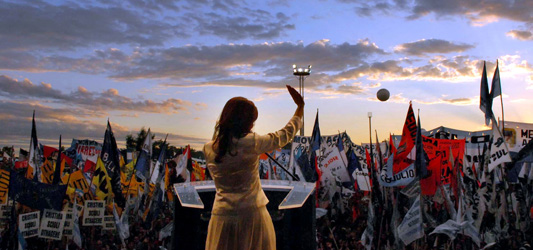Q & A: Argentina’s elections
Fourteen candidates are running for president, including the current leader’s wife.

 |
| The wife of the current president enjoys a good deal of popular support [AFP] |
Argentinians go to the polls on October 28, electing their next president to a four-year term in office.
Why now?
Good question. Nestor Kirchner, the president, surprised many people by announcing he would not run for a second term.
Generally, he was doing well in the polls and was presiding over a booming economy that had left Argentina’s 1999-2002 crash far behind.
Instead, he has left the way open for Cristina Fernandez de Kirchner, his wife, to run as the presidential candidate for his Front for Victory (FV) party.
Any ideas why?
Argentina’s presidency runs for a maximum of two terms. Some people have suggested Kirchner intends for Cristina to continue his work for four years before he moves to re-take the reigns again in 2011.
But his wife is a diplomat in her own right and by some estimations is actually more popular than he is.
Her husband’s government has also recently been hit by a series of corruption scandals and she would be able to distance herself from his mistakes but still offer continuity.
Kirchner himself has not given a reason for not running.
Is his wife expected to anything differently if elected?
Analysts expect her to take a stronger role in foreign affairs than her husband, but Kirchner herself has been generally rather quiet about what her policies will be and has avoided debating them during this campaign season with the other candidates.
So there are other candidates as well?
| In depth | ||
|
There are 14 people are in the running for the job, including Elisa Carrio who served in Congress from 1995 to 2007 and finished fourth in the 2003 presidential race.
Carrio, from the Afirmacion para una Republica Igualitaria (ARI) party, has criticised president Kirchner’s economic policies, saying they have led to inflation and widened the gap between rich and poor.
Roberto Lavagna, a former economy minister, is also running. He is the candidate for the Una Nacion Avanzada (UNA) party and has taken the campaign slogan: “Stop Inflation, Vote Lavagna”.
Both Carrio and Lavagna have said if elected they would soften relations with Hugo Chavez, Venezuela’s president, and focus on regional trade relations.
But Kirchner still looks by far the most likely candidate. The opposition is fragmented and Kirchner has polled around 25 points ahead of other candidates in pre-election public opinion surveys.
If Kirchner is successful in the upcoming elections, she would be the first elected woman to be president of Argentina.
What are the issues?
The economy, with inflation in particular, is a key issue for most people.
Inflation is said to have been running at about eight per cent, but most economists believe the figures have been manipulated and that the real rate is more than twice as high.
Consumers have complained that food prices, especially those of vegetables, have rocketed – with tomato prices rising so high they became more expensive than meat.
As the economy picks up the demand for electricity and gas has soared. Parts of Argentina still continue to experience blackouts and shortages and the power cuts have had serious repercussions on industry.
Energy is also a political issue because, following the economic crisis, the government froze prices on utilities such as gas and electricity to keep them affordable.
But the freeze is still in place and with prices among the cheapest in the world, electricity and gas companies have had little incentive to invest in greater production.
Crime is also a key issue. Though considered one of the safest countries in Latin America in the 1990s, voter perception is that crime has soared.
A recent poll showed that 75 per cent of Argentines believe crime is worsening in Argentina.
According to Lavagna an average of eight Argentines are murdered every day and one in four residents has a been victim of violent crime in the past year.
What is the system for voting?
Argentina is made up of 24 electoral districts – 23 provinces and the Federal Capital of Buenos Aires.
To avoid a runoff vote, a candidate must win at least 45 per cent of the vote, or gain at least 40 per cent and defeat the nearest challenger by 10 percentage points.
